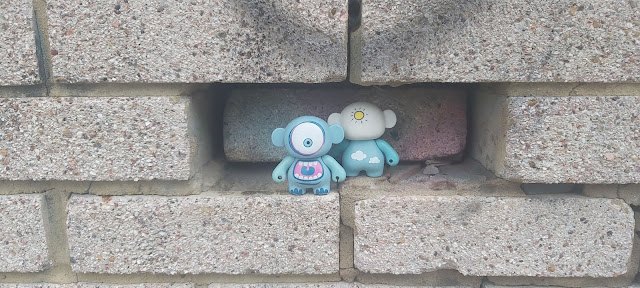 I'm not going to soul search here. I'm just going to report the facts. I bought Mondo and Sky Blue when I lived at Clapham Junction, to serve as a surrogate couple we could take with us on holiday and photograph in case we didn't work out as a couple ourselves. Mondo had one eye, and a goofy grin across his belly. Sky Blue's face was clear apart from the sun. These two vinyl figures came with us everywhere for six and a half years, and they stayed with me in the flat in Forest Hill when the time came for me to live there on my own. That's them, above. The night before my first night alone, I wrote the following in the notes app on my phone at 3am:
I'm not going to soul search here. I'm just going to report the facts. I bought Mondo and Sky Blue when I lived at Clapham Junction, to serve as a surrogate couple we could take with us on holiday and photograph in case we didn't work out as a couple ourselves. Mondo had one eye, and a goofy grin across his belly. Sky Blue's face was clear apart from the sun. These two vinyl figures came with us everywhere for six and a half years, and they stayed with me in the flat in Forest Hill when the time came for me to live there on my own. That's them, above. The night before my first night alone, I wrote the following in the notes app on my phone at 3am:Those go there.
Mondo and Sky Blue.
Except they don't go there any more
Because there are more gaps now.
But you can't just move stuff, because then it's just things in a room and it's cold outside and that's all you have when this was going to be a home.
And you've made nothing that can be hung on a wall in fifteen years.
I wrote more than that too.
They came with me when I moved to Mornington Crescent a year later, and they came with me to Notting Hill. I didn't know what to do with them, all my ideas seemed stupid, but here's the one I finally went with: near where we used to live in Loughborough Junction, there's a small, unexplained indentation in the wall where a brick has been slightly knocked in.
On the 29th of August I took Mondo, Sky Blue, and a small bottle of Loctite, and I set them there. Sky Blue was glued a little more firmly as I couldn't find as flat a base for Mondo, but both stuck, and I took a photo and then left them, feeling I'd done something actually quite self-indulgent and pointless:
A week later, on the 5th of September, I returned to Brixton and decided to check up on them. They were still there, but I noticed that Mondo had come unstuck. Someone must have moved them to see if they were glued down, snapped Mondo off, but then left him there unacquired. I was touched by this. I wondered if anything like this would happen in Notting Hill, if anyone would just leave something standing. I took a photograph, and decided to check up on them whenever I was south. As I may have said before, I have no memory of ever experiencing closure on anything:
I revisited them again, a week later, on the 12th of September. They were still there. Sky Blue glued in place. Mondo left loose:
And the 20th of October:











